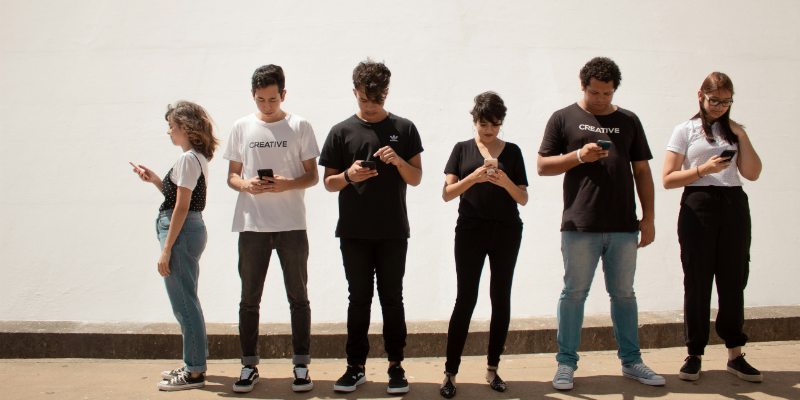Making sense of our connected world

No Smartphone = Cringe Weirdo
Smartphones boycott boredom. And boycotting boredom is neglecting an existential state of being. How about daydreaming or napping when others scroll feeds? In this blog post, author Jascha Bareis shares his experiences since getting a smartphone just this year.
Since the beginning of this year I possess a smartphone next to my brick phone. After constant resistance against the creeping but tenacious power of the “normal” I surrender. Not because of conviction but because of the price I have to pay on a daily basis. Ultimately, my bank forced me to do so because I was kicked out of my messaging TAN-verification process now only being done by scanning QR-codes. To change the bank until the new one would also force me to deal with QR-codes felt like a hopeless cause. Like Don Quixote raging against windmills.
I believe that it is hard to comprehend how one sees the world when only living with a brick phone. There are currently loads of discussions in digital governance about issues like misinformation, the platformisation of social media, or about the power accumulation of digital gurus like Elon Musk. But all this would be nothing without smartphones. TikTok, Instagram or X only exist because of the medium of the smartphone. It is the gatekeeper between the analogue and virtual world, catching us in the constant hybrid state of in-between with taking pictures of moments we hold dear, sharing instant emotions, chatting, liking, infinite-scrolling of the daily digests.
It is not only about discriminating but being
It’s not just that you get excluded without a smartphone (yes, you do), it is that you do not take part in what is taken for granted. In 2023, 68% of the world population used a smartphone. 05:01 (!) hours is the average daily time users spent with their phone, with figures rising. In the beginning I boycotted smartphones because of the Snowden revelations in 2013. Back then I cared about privacy. But with time I realised that my motivations lied deeper, because I could observe what smartphones did to this world. And what they did to me or my social perception: From being a trend-ignorer back then to being confronted like a cringe weirdo now when GenZ’s see my old NOKIA.
Name a more invasive technology that transformed the globe in the last decades – except perhaps the internet. This invasiveness is not only demonstrated in screen-time, but also by acknowledging how smartphones have changed our perception and being regarding the most basic categories of existence. There are so many worrying structural effects on media and democracy because of smartphones. But let’s just have a look at individual effects: Take acceleration (stress through compression of time and events), personality (creating alter egos that need to be caressed like Tamagotchis), love (honesty and emotional responsibility à la ghosting on Tinder), sleep (quantifying “quality” bed-hours), crisis (the feeling that the world has gotten worse today than in the 90s because of constantly consuming distressing and hedonistic depressive content).
There is no better example to illustrate what smartphones do than introducing feelings of boredom into the picture.
Whenever you are be somewhere else
Having a smartphone equals boycotting boredom. Or at least making it very hard for boredom to sneak in with reality constantly being interrupted by a penetrating app. The human being is arguably the only being on this planet that has the ability to be bored. It can reflect upon its existence. In the absence of external stimuli, one is thrown into the mental state of limbo, one drifts away, makes foolish and absurd associations by contemplating the mundane. Boredom is important because it invites a state of relaxation, daydream and idleness. It is the welcoming of thoughts without expecting anything.
I am convinced that people who can be bored are more at ease with themselves. But the act of simply indulging in uncoerced silence and realizing that the absurd hides at every corner has become difficult for so many people. And this says a lot about the cultural and mental constitution of our consumerist society. Cultural theories Marl Fisher once said:
Boycotting boredom is an existential challenge that has been eliminated now. If no one is bored everything is boring. At a bus stop where you previously were bored, now you immediately reach out for your phone. You cover over that terror of boredom.
Fisher wrote as a critic on what he analysed as capitalist realism, the state of being constantly oversaturated and nervously distressed, or as he puts it “hedonistically depressed” – without anything really changing. If you want it less theoretical, let comedian Louis C.K. explain you why he does not give a smartphone to his kids:
Teaching with 10sec-TikTok-fingerfood is the future
When I taught at university, I felt Fisher and Louis CK very much. I presented the semester reading material for the students in class. They were seriously shocked when realising that they needed to read entire papers and protested. Do I now have to teach thought-provoking texts like TikTok 10 sec fingerfood? I should have quoted Fisher with charcoal on the blackboard:
Deficit hyperactivity disorder is a pathology, it is a pathology of late capitalism – a consequence of being wired into the entertainment – control circuits of hyper me-diated consumer culture.
Not having a smartphone converts one into an anti-consumerist punk. Absurdly, though, because of boredom I feel so more conscious, energetic and playful when I really do something. Sure, boredom makes you confront uncomfortable questions about yourself and the world. That is not always nice but pushing this away with scrolling feeds is treating symptoms, not the cause. Once you can deal with such a state of being, contemplation and playful energy sparks. Absurdly, boredom even makes sense facing neoliberal precarity: You gain more resilience facing a risk society of constantly looming pressure and instability – by the simple state of being. I know that I work much less than others. Doing something consciously when others scroll feeds and timelines seems like a good trade off.
You think fasting alcohol, sex or chocolate is brave. Well, boycott the smartphone for two months. You will see yourself and the world with different eyes. But, yep, you will have to find a workaround for online banking. The fact that now one is forced to have a smartphone for that is pretty scandalous.
This post represents the view of the author and does not necessarily represent the view of the institute itself. For more information about the topics of these articles and associated research projects, please contact info@hiig.de.

You will receive our latest blog articles once a month in a newsletter.
Featured topics
The Human in the Loop in automated credit lending – Human expertise for greater fairness
How fair is automated credit lending? Where is human expertise essential?
Impactful by design: For digital entrepreneurs driven to create positive societal impact
How impact entrepreneurs can shape digital innovation to build technologies that create meaningful and lasting societal change.
Identifying bias, taking responsibility: Critical perspectives on AI and data quality in higher education
AI is changing higher education. This article explores the risks of bias and why we need a critical approach.




